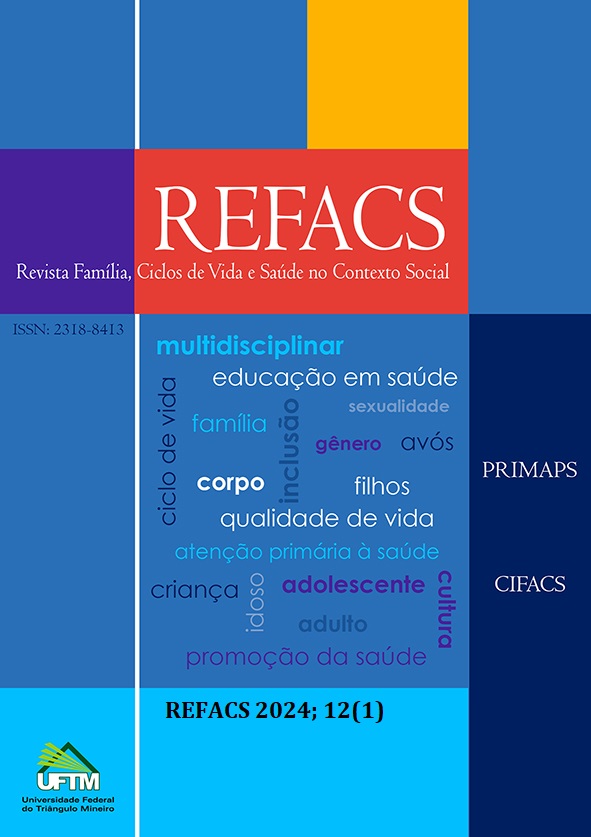Nomophobia and its repercussions on the occupations of university students
DOI:
https://doi.org/10.18554/refacs.v12i1.7238Keywords:
Internet addiction disorder, Occupations, Student healthAbstract
Objective: to investigate the existence of nomophobia among university students and its occupational repercussions. Methods: quantitative-qualitative research, with a descriptive approach, carried out with academics from a Brazilian federal public university between the years 2022 and 2023. Data were collected through the Nomophobia Questionnaire validated version for Brazilian Portuguese of the application, after the experience taken from smartphones during the period of one school shift. Content analysis and descriptive analysis were used. Results: 68 university students participated, with an average age of 22 years, of which 54 identified as women. The students scored above 20 points, highlighting 50% moderate and 23.5% in degree of Nomophobia. Three thematic categories were constructed: Reactions to moving away from smartphone related occupations; Occupations, forgetfulness and searching for the device; and Peace of mind by being involved in another activity. Conclusion: the unrestricted and unrestrained use of smartphones can lead to losses in the performance of other occupations such as academic activities, leisure, social participation and rest and sleep of these students, and can evolve into conditions that compromise health and well-being as is the case of nomophobia.
References
Sindicato das Entidades Mantenedoras de Estabelecimentos de Ensino Superior no Estado de São Paulo. Mapa do ensino superior no Brasil 2020 [Internet]. 2. ed. São Paulo: Instituto SEMESP; 2020 [citado em 10 nov 2023]. 192 p. Disponível em: https://www.semesp.org.br/wp-content/uploads/2020/04/Mapa-do-EnsinoSuperior-2020-Instituto-Semesp.pdf
Felisoni DD, Godoi AS. Cell phone usage and academic performance: an experiment. Comput Educ. [Internet]. 2018 [citado em 12 nov 2023]. 117:175-87. Disponível em: https://www.sciencedirect.com/science/article/abs/pii/S0360131517302324
Guerin CS, Priotto EMTP, Moura FC. Geração Z: a influência da tecnologia nos hábitos e características de adolescentes. Revista Valore [Internet]. 2018 [citado em 10 nov 2023]; 3:726-34. Disponível em: https://revistavalore.emnuvens.com.br/valore/article/view/187/187
Gurbuz IB, Ozkan G. What is your level of nomophobia? an investigation of prevalence and level of nomophobia among young people in Turkey. Community Ment Health J. [Internet]. 2020 [citado em 10 nov 2023]; 56(5):814-22. Disponível em: https://link.springer.com/content/pdf/10.1007/s10597-019-00541-2.pdf
León-Mejía A, Calvete E, Patino-Alonso C, Machimbarrena JM, González-Cabrera J. Cuestionario de Nomofobia (NMP-Q): estructura factorial y puntos de corte de la versión española. Adicciones (Palma de Mallorca) [Internet]. 2020 [citado em 24 maio 2023]; 33(2):137-47. Disponível em: https://www.adicciones.es/index.php/adicciones/article/view/1316/1089
Bragazzi N, Del Puente G. A proposal for including nomophobia in the new DSM-V. PRBM. Psychol Res Behav Manag. [Internet]. 2014 [citado em 10 nov 2023]; 7:155-60. Disponível em: https://www.ncbi.nlm.nih.gov/pmc/articles/PMC4036142/pdf/prbm-7-155.pdf
Mir R, Akhtar M. Effect of nomophobia on the anxiety levels of undergraduate students. J Pak Med Assoc. [Internet]. 2020 [citado em 12 nov 2023]; 70(9):1. Disponível em: https://www.archive.jpma.org.pk/PdfDownload/10094
American Occupational Therapy Association. Occupational therapy practice framework: domain and process. Am J Occup Ther. [Internet]. 2020 [citado em 12 nov 2023]; 74(Suppl 2): 7412410010. Disponível em: https://ovidsp-dc2-ovid-com.ez33.periodicos.capes.gov.br/ovid-new-b/ovidweb.cgi?&S=OKFFFPMNHJEBAKCPIPJJBGLECLPNAA00&WebLinkReturn=Full+Text%3dL%7cS.sh.22.24.25.28.32%7c0%7c00000448-202008002-00001&PDFLink=FPEBIPLEBGCPHJ00%7c%2ffs046%2fovft%2flive%2fgv023%2f00000448%2f00000448-202008002-00001&PDFTitle=Occupational+Therapy+Practice+Framework%3a++Domain+and+Process-Fourth+Edition.&link_set=S.sh.22.24.25.28%7c1%7csl_10&Counter5=FTV_as_pdf%7c00000448-202008002-00001%7covft%7covftdb%7covftv
Valério DOS, Oliveira SRPS, Facundes VLD, Oliveira MPCA, Silva VBF, Gontijo DT. “O pessoal deveria escutar mais a gente”: relações entre ocupações e saúde na adolescência. Research, Society and Development [Internet]. 2020 [citado em 10 nov 2023];9(10):e9899109365. Disponível em: https://rsdjournal.org/index.php/rsd/article/download/9365/8443/130776
Bardin L. Análise de conteúdo. 3ª reimpressão. São Paulo: Edições 70; 2016. 281p.
Lima RHA, Santos PDA, Vasconcelos GV, Leite EDLG, Kubrusly M. Adaptação transcultural e validação do Nomophobia Questionnaire (NMP-Q) para a língua portuguesa (NMP-Q-BR). J Health Biol Sci. [Internet]. 2020 [citado em 12 nov 2023]; 8(1):1-6. Disponível em: https://periodicos.unichristus.edu.br/jhbs/article/view/3052/1205
Carrasco MJ, Olivares AD. Haciendo camino al andar: construcción y comprensión de la ocupación para la investigación y práctica de la Terapia Ocupacional. Rev Chil Ter Ocup. [Internet]. 2008 [citado em 24 abr 2024]; (8):5-16. Disponível em: https://revistaterapiaocupacional.uchile.cl/index.php/RTO/article/view/55/38
Machado DV, Eisenberg Z. um estudo sobre nomofobia e crenças de autoeficácia acadêmica em estudantes universitários. SciELO Prepr. [Internet]. 2023 [citado em 12 nov 2023]. Disponível em: https://preprints.scielo.org/index.php/scielo/preprint/view/5800/11161
Dicio. Atormentar [Internet]. In: Dicio. Dicionário Online de Português. Porto: 7Graus; 2023 [citado em 10 nov 2023]. Disponível em: https://www.dicio.com.br/atormentar/
Balbinotti S, Moura AMM. Ansiedade informacional em alunos de curso preparatório para ingresso no ensino superior: um estudo no Emancipa da unidade Centro Histórico de Porto Alegre. RICI: R Ibero-Amer Ci Inf. [Internet]. 2021 [citado em 12 nov 2023]; 14(1):171-93. Disponível em: https://periodicos.unb.br/index.php/RICI/article/view/31376/28751
Hasmawati F, Samiha YT, Razzaq A, Anshari M. Understanding nomophobia among digital natives: characteristics and challenges. Journal of Critical Reviews [Internet]; 2020 [citado 23 abr 2024]; 7(13):122-31. Disponível em: https://drive.google.com/file/d/1_YHnODP_3FfGGv1l465C6yHIVbUwX-PG/view?usp=sharing
Vinagre FDD. Investigação sobre os efeitos negativos do uso do celular na saúde, nas ocupações e no desempenho de estudantes universitários [Internet]. [Trabalho de Conclusão de Curso]. 31 f. Brasília, DF: Universidade de Brasília; 2019 [citado em 12 nov 2023]. Disponível em: https://bdm.unb.br/bitstream/10483/35071/1/2019_FernandaDesireeDiasVinagre_tcc.pdf
Christiansen CH, Townsend EA. An introduction to occupation. The art and science of living. Upper Saddle River, NJ: Pearson; 2010. Occupational justice. p. 329-58.
Schell BAB, Gillen G, Scaffa ME. Willard & Spackman Terapia Ocupacional. 12ª ed. Buenos Aires/Argentina: Editorial Médica Panamericana; 2016. 1294p.
Published
How to Cite
Issue
Section
License
Copyright (c) 2024 JOURNAL FAMILY, CYCLES OF LIFE AND HEALTH IN SOCIAL CONTEXT

This work is licensed under a Creative Commons Attribution-NonCommercial 4.0 International License.
Each of the authors of the manuscript must complete and sign a copy of Statement of Responsibility and Copyright Transfer Agreement, which must be attached, by the submitting author, in step 4 of the submission process in the journal system (Click on the "Browse" option, select the file that should be inserted in pdf format, click on the "Download" button, in the "Title" field type: Declaration of responsibilities, then click the "Save and Continue" button and proceed with the submission process.
Note: Including scanned signature will not be accepted. Each author of the manuscript must complete a declaration individually.

REFACS de Universidade Federal do Triângulo Mineiro está licenciado com uma Licença Creative Commons - Atribuição-NãoComercial 4.0 Internacional.
Baseado no trabalho disponível em www.uftm.edu.br.
Podem estar disponíveis autorizações adicionais às concedidas no âmbito desta licença em http://www.uftm.edu.br/refacs.



